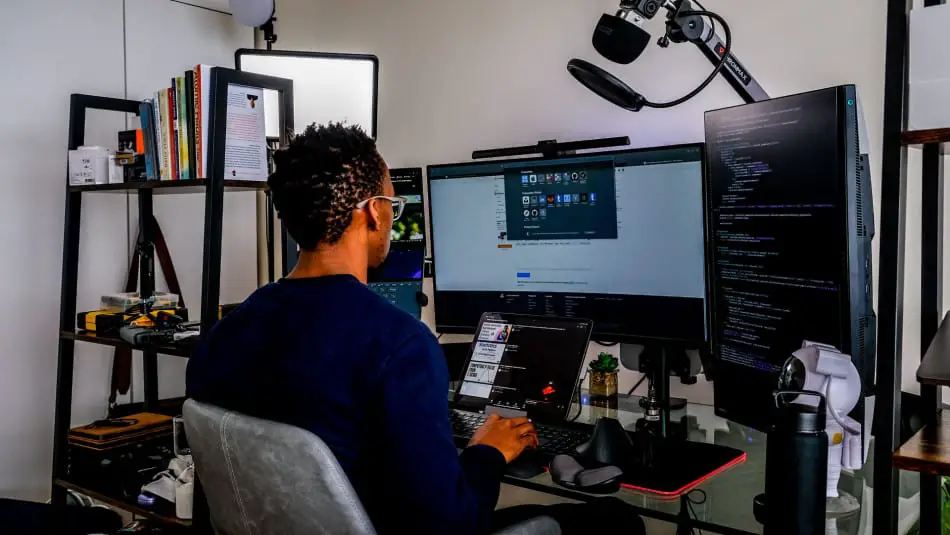Python is famously one of the simplest programming languages to learn. Even those who have no programming knowledge or coding background can learn to code a basic Python program in mere minutes.
This is reassuring, as it makes Python one of the best places to start with programming.
But the crucial question is, do you need formal training, or can you learn Python on your own?
It is possible and relatively easy to learn Python on your own. Many online tutorials and training websites or apps provide free or inexpensive Python training. Python is complex when you get to advanced levels, and you won’t have a qualification, but the skills are easy to learn.
Not only is it possible to learn Python on your own, but it is also ridiculously easy, at least in the early stages. But there are possible pitfalls to look out for that could complicate matters for you.
If you are aware of these potential pitfalls, you will be able to plan ahead and work around them.
So, let’s go into that a bit more.
Can You Learn Python On Your Own?
Python is among the most often-used programming languages. It is used to create a range of programs, from stand-alone desktop applications to mobile apps.
Even many well-known websites, like Facebook and YouTube, make use of Python for parts of their functionality.
It was even rated the fourth most popular programming language in 2020, and its popularity is only increasing.
But despite its widespread popularity and variety of uses, Python is rated one of the six most straightforward programming languages to learn and regarded by many as the number one easiest programming language.
Most experts claim that it will take you around two months to learn the basics and about six months to a year in total to become a Python expert.
This means that Python is easy to learn on your own, too. Here are some of the primary factors that make it so easy to do.
Python’s Simple Syntax

Python’s language and syntax are very close to English. Most words aren’t overly complicated, and you will get used to them almost instantly.
Strangely, many people who have never programmed at all find it easier to learn and get used to Python than those who have been using other programming languages for years.
Python’s simple language and syntax are so different from other programming languages that it can often be a complete paradigm shift for experienced programmers to learn Python.
Having said that, if you already have programming knowledge, don’t let that scare you off.
The change happens quite quickly, and once you grasp the simplicity of Python, chances are that you will love it.
Freely Available Python Software
Python is free since it is an open-source programming language, meaning it is free to download, install, and use in any way you want.
You can download Python for free from the main Python website at python.org and install it on any (or even all) of your devices.
The Python installation even includes the IDLE and Python Shell development environments, so you don’t have to download any other software to get started.
Unfortunately, these two IDEs can get frustratingly limited as your skills develop.
You can download many other Python IDEs, and most of the popular ones are free (or, at least, have free versions).
One of the most popular ones is PyCharm. It has a feature-packed Professional edition that’s not free, but the free Community Edition is perfect for all but the most advanced Python projects.
The Wealth Of Python Resources
There is no lack of resources available for you to learn Python.
There are books, eBooks, websites, YouTube video tutorials, and more formal training platforms that you can find online, so you can learn Python however you want to and feel comfortable with.
A few of the most popular and valuable resources include:
W3 Schools
Though it started as an HTML training resource, W3 Schools has since expanded to include all kinds of tutorials, including Python.
It is free of charge and caters very well to beginners and lower-intermediate levels. If you are just getting started, you can go to the Python Introduction page for some background info before you get down to coding.
W3 Schools also has a wealth of excellent little Python exercises to practice your skills.
Another fantastic thing about W3 Schools is that you don’t have to install any software, at least not in the beginning.
You can code right there on the website, where an online Python compiler will compile and run your code so you can test it.
HackerRank
Despite how the name sounds, HackerRank has nothing to do with cybercrime. It is a website that offers training and skill evaluation services to corporations.
You can sign up for a free individual account, though, and make use of HackerRank’s free Python tutorials and exercises.
One great thing about HackerRank is that it goes beyond W3 Schools’ offering.
You can go well into the intermediate level and even scratch the surface of advanced Python skills using just a free HackerRank account.

YouTube Tutorials
YouTube has hundreds, or even thousands, of Python training videos and playlists, from basic to advanced. Some focus on performing a particular function using Python, while others are more general tutorials.
Two of the best-rated and most popular options are freeCodeCamp’s “Learn Python – Full Course for Beginners” and Programming with Mosh’s “PythonTutorial – Python Full Course for Beginners.”
Each of these videos is well over four hours long and provides everything you need to get past the primary stages of Python.
If you just want to get started with a shorter tutorial, then check out this one from Dataquest:
Python Books
There’s a wealth of Python books available online. You can simply open your Kindle app or the Amazon website and find hundreds of different Python books written by experienced programming professionals.
The number one most popular Python book recommended by most users who have learned Python by themselves is “Python Crash Course” by Eric Matthes.
You can get it on Kindle or buy it as a paperback if you don’t like eBooks.
It’s been a bestseller worldwide since the first edition was released, so you know you’re getting the best Python book possible.
Online Learning Platforms
Formal online learning platforms have increased in popularity over the last few years.
Websites and apps like Udemy and Stackskills are well-known and often the go-to for many people who want to learn new skills without going to college.
The training is usually top-notch, presented by leading experts, and every bit as good as (if not better than) college lectures.
Both Udemy and Stackskills have excellent Python courses. For example, one of Udemy’s top-rated Python courses offers training for beginners up to the upper-intermediate level in just one course.
There are also other platforms to look into, like CodeCademy and Coursera.
An advantage of these platforms is that they will give you certificates of completion.
Though that is by no means a valuable qualification, it is proof that you completed the course and have knowledge of Python.
GitHub And Stack Overflow
GitHub and Stack Overflow are popular websites where programmers collaborate over code.
They offer spaces where you can share your challenges and get answers from more experienced programmers about how to solve them.
You can also search through the repositories and forum posts to try and find pieces of code that can do what you want to do.
Though these are not necessarily resources for absolute beginners, they are invaluable for progressing from intermediate to advanced.
Any would-be programmer should create accounts on both Stack Overflow and GitHub.
Proof That You Can Learn Python On Your Own
What better way to prove that you can learn Python on your own than by showing examples of people who have already done so successfully? One such person is Angelica Dietzel.
Angelica has an impressive background. She is well-versed in Python and has built many machine learning and artificial intelligence platforms by herself.
She’s even written tutorials to teach others to do similar things using only Python.
Angelica is a well-respected personality and influencer in the coding world, and her opinions on matters carry weight.
The exciting thing is that Angelica is a college drop-out who decided to teach herself Python.
She did not get formal training or qualifications but simply worked her way up by learning the necessary skills.
Machine learning and artificial intelligence can be some of the most complicated systems to develop, and Angelica did that with nothing but her self-taught Python knowledge.
-> Learn more about the 7 best websites for self-learning
Potential Pitfalls To Learning Python On Your Own
As simple and straightforward as it is to learn Python on your own, there are also some potential pitfalls and complications to watch out for.
These are not insurmountable, but being aware of the possibility and watching out for it will win half the battle already.
You Won’t Get A Qualification

Perhaps you won’t care about this, depending on your reasons for wanting to learn Python, but most self-learning options don’t provide a qualification.
Udemy and some other “formal” training platforms offer certificates of completion once you’ve completed the requirements set by the instructor. Still, these don’t really count as accredited qualifications.
If you want to learn Python simply for your own use, either as a hobbyist or because you want to start your own business, learning it on your own is a perfect solution.
But if you want to look for employment with your Python knowledge, things can get a bit more complicated since many employers still look at formal qualifications as one of their crucial requirements.
The good news is that this qualification-driven focus is changing a bit.
If you can prove beyond a shadow of a doubt that you have the knowledge they require, you can still find employers who will offer you a job as a Python developer.
But how do you prove it?
There are various ways for you to achieve this:
- Create your GitHub account and publish some of your work there. You can add a link to these programs in your résumé and use GitHub as your portfolio. Employers can look at these programs as proof of your skills and knowledge.
- Contribute to open-source projects. Once again, GitHub will prove invaluable. You can find various open-source projects there to which you can contribute some code. Find a project that you like, then add code to improve some aspects of it. When you are listed as a contributor to a project, you will gain recognition and have even more proof of your skills.
- Find a specialist arena. If you find that some topic or industry fascinates you more than others (perhaps another field of study that you pursued at one stage), invest your time and energy into learning everything you can about that. Again, Angelica Dietzel is a good example.
She loved artificial intelligence and machine learning so much that she decided to specialize in those fields with her Python programming. Python has so many applications and uses that you can use it for almost any industry you can think of.
You can use Python to show off your knowledge of an industry, carving out a nice little niche for yourself that will make employers fight one another to get you into their companies. - You may write the Python Institute’s exams. The Python Institute offers exams that you can write to get formal certifications. These exams are offered by Pearson institutes and various other colleges and study centers worldwide, and you don’t have to enroll in a formal course to take them. Once you have enough knowledge, write the exam and get qualified.
Python Gets More Complex As You Progress

When you learn Python on your own, you will write your first “Hello World” program within only a few minutes and feel very good about yourself.
The next few lessons will be fun and challenging, but you will overcome them relatively quickly. This will boost your confidence levels and keep you going.
But there may come the point where the tutorials or guides you’re working through will start confusing you.
Especially for new programmers, concepts like classes, objects, procedures, functions, and methods can cause confusion and frustration.
In a typical class environment, you would be able to ask questions and get further clarification, but that isn’t possible with a book or YouTube tutorial.
This frustration can cause people to give up or doubt their own abilities. Don’t quit! Keep at it, and you will find that your skills will improve exponentially.
Once you grasp that complex topic, you will have a much clearer understanding of it and even be able to teach it to others simply. There are a few things that could help you defeat the discouragement and move forward:
- Don’t start to doubt your abilities because you don’t grasp a concept. Remember that programming is a decades-old industry with its own jargon and slang. If you’re new to the programming world, it could be just as difficult for you to understand as for a high school student to grasp complex university-level medical terminology.
It is unrealistic to expect you to understand everything immediately, and many of these online tutorials or books may assume you already have some programming background. Or the instructors might explain it in a way that makes sense to them but not you. - Try other tutorials. When you get stuck on a topic, it could be because the instructors assume you already understand the concepts behind it or because they explain it in a way that doesn’t make sense to you.
Search YouTube for a video about that particular topic. Look at the comments since other people might have already asked the same question.
If you are following a training program on Udemy or one of the other training platforms, you will likely have an option to ask the instructor questions or post your question in some forum for the students taking that course. Don’t be afraid to use that option. - Ask for help. For the most part, the programming community is a constructive group of people that will gladly answer your questions. There are places on Stack Overflow that are dedicated to helping newcomers, so ask your questions. You can also find programming groups on platforms like forums and Facebook, where you can get the help you need.
- Google for it. If you don’t want to ask a question, use your trusty search engine to find the solutions or answers that you’re looking for. Somewhere in the world, someone already had that same struggle and might have received the help they needed. Don’t be afraid to look for their questions and find the solutions that people have offered them.
-> Learn More about Self-Learning vs. Classroom Learning: Which Is Better?
Does Learning Python On Your Own Make You Sub-Par?

The answer to this question is a definite “no.” Universities and colleges are full of programming courses and qualifications these days, but it wasn’t always like that.
The very first programmers had to figure it out independently, with only complicated guidebooks and user manuals to help them.
As good as formal education is, the fact remains that many of the world’s most excellent programmers taught themselves.
You can truly develop your skills at your own pace, all while specializing in the things you find interesting. You could even become a better programmer because of that fact.
Exams don’t make you a programmer, after all.
Conclusion
You can learn Python on your own and even become an expert at it. Programming at its very core is a complex thing, but Python makes it all much more accessible.
With all the Python knowledge you could ever want available at your fingertips, you could become a professional Python developer in only a few months.
This will open up a world of new possibilities for you, so be bold and go for it!
-> Check out our own guide on how to self learn Python if you’re ready to get started.
References
- https://www.quora.com/Can-I-learn-Python-by-myself
- https://www.quora.com/How-is-the-website-W3School-for-learning-Python
- https://www.quora.com/As-a-self-taught-programmer-can-I-realistically-get-a-job-programming-in-Python-If-so-what-specifically-will-be-the-minimum-skill-set-required-to-land-a-job
- https://brainstation.io/career-guides/how-long-does-it-take-to-learn-python
- https://www.dataquest.io/blog/how-long-does-it-take-to-learn-python/
- https://www.dataquest.io/blog/learn-python-the-right-way/
- https://www.coursera.org/articles/how-long-does-it-take-to-learn-python-tips-for-learning
- https://www.bestcolleges.com/bootcamps/guides/6-easiest-programming-languages-to-learn/
- https://www.youtube.com/results?search_query=python+tutorial
- https://github.com/python
- https://stackoverflow.com/questions/tagged/python
- https://pythoninstitute.org/pcep






